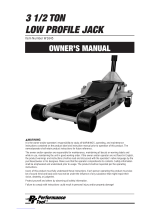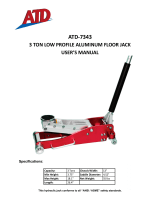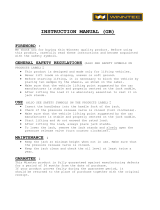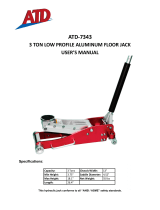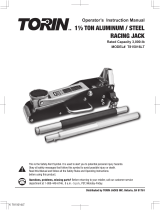Page is loading ...


Page 2 For technical questions, please call 1-888-866-5797. Item 61382
SAFETY OPERATION MAINTENANCESETUP
Table of Contents
Safety ......................................................... 2
Setup .......................................................... 4
Operation .................................................... 8
Maintenance .............................................. 10
Parts List and Diagram .............................. 14
Warranty .................................................... 16
WARNING SYMBOLS AND DEFINITIONS
This is the safety alert symbol. It is used to alert you to potential personal injury hazards.
Obey all safety messages that follow this symbol to avoid possible injury or death.
Indicates a hazardous situation which, if not avoided,
will result in death or serious injury.
Indicates a hazardous situation which, if not avoided,
could result in death or serious injury.
Indicates a hazardous situation which, if not avoided,
could result in minor or moderate injury.
Addresses practices not related to personal injury.
IMPORTANT SAFETY INSTRUCTIONS
1. Study, understand, and follow all instructions
before operating this device.
2. Do not exceed rated capacity.
3. Use only on hard, level surfaces.
4. Lifting device only. Immediately after lifting,
support the vehicle with appropriate means.
5. Do not move or dolly the vehicle while on the jack.
6. Failure to heed these markings may result in
personal injury and/or property damage.
7. Lift only areas of the vehicle as specified
by the vehicle manufacturer.
8. No alterations shall be made to this product.
9. Never work on, under or around a load
supported only by this device.
10. Do not adjust safety valve.
11. Wear ANSI-approved safety goggles and
heavy-duty work gloves during use.
12. Keep clear of load while lifting and lowering.
13. Lower load slowly.
14. Apply parking brake and chock
tires before lifting vehicle.
15. Lift vehicle only at manufacturer
recommended locations.
16. Inspect before every use; do not use
if parts are loose or damaged.
17. Do not use for aircraft purposes.
18. The warnings, precautions, and instructions
discussed in this manual cannot cover all
possible conditions and situations that may occur.
The operator must understand that common sense
and caution are factors, which cannot be built into
this product, but must be supplied by the operator.
19. The brass components of this product contain lead,
a chemical known to the State of California to cause
cancer, birth defects (or other reproductive harm).
(California Health & Safety Code § 25249.5, et seq.)
IMPORTANT! Before first use:
Check hydraulic fluid level and fill to 1/4″ below
the fill port as needed. Thoroughly test the
Jack for proper operation. If it does not work
properly, bleed air from its hydraulic system as
stated in Bleeding Instructions on page 5.

Page 3For technical questions, please call 1-888-866-5797.Item 61382
SAFETYOPERATIONMAINTENANCE SETUP
Air Source
1. Never connect to an air source that is
capable of exceeding 200 psi.
Over pressurizing the tool may cause
bursting, abnormal operation, breakage
of the tool or serious injury to persons.
Use only clean, dry, regulated compressed air at the
rated pressure or within the rated pressure range as
marked on the tool. Always verify prior to using the
tool that the air source has been adjusted to the rated
air pressure or within the rated air-pressure range.
2. Never use oxygen, carbon dioxide, combustible
gases or any bottled gas as an air source
for the tool. Such gases are capable of
explosion and serious injury to persons.
Symbol Definitions
Symbol Property or statement
PSI
Pounds per square inch of pressure
CFM
Cubic Feet per Minute flow
SCFM
Cubic Feet per Minute flow
at standard conditions
NPT
National pipe thread, tapered
Symbol Property or statement
WARNING marking
concerning Risk of Eye Injury.
Wear ANSI-approved eye protection.
WARNING marking concerning Risk of
Hearing Loss. Wear hearing protection.
WARNING marking concerning
Risk of Respiratory Injury. Wear
NIOSH-approved dust mask/respirator.
WARNING marking concerning
Risk of Explosion.
SAVE THESE INSTRUCTIONS.

Page 4 For technical questions, please call 1-888-866-5797. Item 61382
SAFETY OPERATION MAINTENANCESETUP
Initial Tool Set Up
Read the ENTIRE IMPORTANT SAFETY INSTRUCTIONS section at the beginning of this
manual including all text under subheadings therein before set up or use of this product.
Components and Controls
Saddle
Carrying
Handle
Air Lever
Lock
Jack
Handle
Release
Valve
Fulcrum
Fill
Plug
Air
Lever
Air
Inlet
Figure A

Page 5For technical questions, please call 1-888-866-5797.Item 61382
SAFETYOPERATIONMAINTENANCE SETUP
Bleeding Instructions
Before each use or if Jack performance decreases,
check for excessive air and proper hydraulic fluid level in Jack. If Jack appears not to be working
properly, it may be necessary to purge its hydraulic system of excessive air as follows:
1. Assemble the Jack Handle by pushing
the two sections together.
2. Remove Fill Plug. Fill with hydraulic fluid
(sold separately) to full level, if necessary.
3. Place the slotted end of the Jack Handle over
the Release Valve, then turn counterclockwise
to open the Release Valve.
4. Insert the Jack Handle into the Fulcrum, apply
downward pressure to the Saddle, then pump
the Jack Handle quickly several times.
5. Check fluid level and, if necessary,
top off with hydraulic fluid.
6. Close the Release Valve by turning it
clockwise, then replace Fill Plug.
IMPORTANT: After bleeding the Jack, test the
Jack for proper operation prior to its actual use.
7. If, after bleeding, the Jack does not appear
to be working properly, do not use it until
repaired by a qualified service technician.
Air Supply
TO PREVENT SERIOUS INJURY FROM EXPLOSION:
Use only clean, dry, regulated, compressed air to power this tool. Do not use oxygen,
carbon dioxide, combustible gases, or any other bottled gas as a power source for this tool.
1. Incorporate a filter, regulator with pressure gauge,
oiler, in-line shutoff valve, and quick coupler for best
service, as shown on Figure B: Portable Air Supply
Setup on page 6 and Figure C: Stationary Air
Supply Setup on page 7. An in-line shutoff
ball valve is an important safety device because
it controls the air supply even if the air hose
is ruptured. The shutoff valve should be a
ball valve because it can be closed quickly.
Note: If an automatic oiler system is not used,
add a few drops of Pneumatic Tool Oil to
the airline connection before operation.
Add a few more drops after each hour of continual use.
2. Attach an air hose (not included) to the compressor’s
air outlet.
Connect the air hose to the Jack’s Air Inlet.
Other components, such as a connector
and quick coupler, will make operation
more efficient, but are not mandatory.
WARNING! TO PREVENT SERIOUS INJURY
FROM ACCIDENTAL OPERATION:
Do not install a female quick coupler on the tool.
Such a coupler contains an air valve that will
allow the air tool to retain pressure and operate
accidentally after the air supply is disconnected.
Note: Air flow, and therefore tool performance, can
be hindered by undersized air supply components.
The air hose must be long enough to reach
the work area with enough extra length to
allow free movement while working.
3. Turn the tool’s throttle or switch to the off position;
refer to Operation section for description of controls.
4. Close the in-line shutoff valve between
the compressor and the tool.
5. Turn on the air compressor according to
the manufacturer’s directions and allow it
to build up pressure until it cycles off.
6. Adjust the air compressor’s output regulator
so that the air output is enough to properly
power the tool, but the output will not exceed
the tool’s maximum air pressure at any time.
Adjust the pressure gradually, while checking the
air output gauge to set the right pressure range.
7. Inspect the air connections for leaks.
Repair any leaks found.
8. If the tool will not be used at this time, turn off
and detach the air supply, safely discharge any
residual air pressure, and release the throttle
and/or turn the switch to its off position
to prevent accidental operation.
Note: Residual air pressure should not be present
after the tool is disconnected from the air supply.
However, it is a good safety measure to attempt to
discharge the tool in a safe fashion after disconnecting
to ensure that the tool is disconnected and unpowered.

Page 6 For technical questions, please call 1-888-866-5797. Item 61382
SAFETY OPERATION MAINTENANCESETUP
Figure B: Portable Air Supply Setup
G
A
E
E
H
F
B
Non-lubricated
Tools
Lubricated
Tools
A
B
C
C
D
A
Description Function
A Air Hose Connects air to tool
B Filter Prevents dirt and condensation from damaging tool or workpiece
C Regulator Adjusts air pressure to tool
D Lubricator (optional) For air tool lubrication
E Coupler and Plug Provides quick connection and release
F Leader Hose (optional) Increases coupler life
G Air Cleaner / Dryer (optional) Prevents water vapor from damaging workpiece
H Air Adjusting Valve (optional) For fine tuning airflow at tool

Page 7For technical questions, please call 1-888-866-5797.Item 61382
SAFETYOPERATIONMAINTENANCE SETUP
Figure C: Stationary Air Supply Setup
N
L
L O
M
C
C
Non-lubricated Tools
Lubricated
Tools
H
I
I
J
J
K
H
F
G
E
Slope
F
F
B
B
A
A
C
D
Description Function
A Vibration Pads For noise and vibration reduction
B Anchor Bolts Secures air compressor in place
C Ball Valve Isolates sections of system for maintenance
D Isolation Hose For vibration reduction
E Main Air Line - 3/4″ minimum recommended Distributes air to branch lines
F Ball Valve To drain moisture from system
G Branch Air Line -1/2″ minimum recommended Brings air to point of use
H Air Hose Connects air to tool
I Filter Prevents dirt and condensation from damaging tool or workpiece
J Regulator Adjusts air pressure to tool
K Lubricator (optional) For air tool lubrication
L Coupler and Plug Provides quick connection and release
M Leader Hose (optional) Increases coupler life
N Air Cleaner / Dryer (optional) Prevents water vapor from damaging workpiece
O Air Adjusting Valve (optional) For fine tuning airflow at tool

Page 8 For technical questions, please call 1-888-866-5797. Item 61382
SAFETY OPERATION MAINTENANCESETUP
Operating Instructions
Read the ENTIRE IMPORTANT SAFETY INFORMATION section at the beginning of this manual
including all text under subheadings therein before set up or use of this product.
Park vehicle on a flat, level, solid, surface safely away from oncoming traffic. Turn off the vehicle’s engine.
Place the vehicle’s transmission in “PARK” (if automatic) or in its lowest gear (if manual).
Set the vehicle’s emergency brake. Then, chock the wheels that are not being lifted.
Raising a Vehicle
1. Place the slotted end of the Jack Handle over
the Release Valve. Turn the Release Valve
completely counterclockwise to lower the
Jack. Then turn the Release Valve completely
clockwise to close the Release Valve.
2. Carefully position the Saddle under the
vehicle manufacturer’s recommended lifting
point. (See vehicle manufacturer’s owner’s
manual for location of frame lifting point.)
3. Raise the Screw Cap Extension by
turning it counterclockwise.
Saddle with
Screw Cap
Extension
Figure D
4. Pneumatic Operation:
a. Connect the compressor’s air hose to the Air Inlet.
b. Release the Air Lever Lock, then depress
the Air Lever until the Saddle has nearly
reached the vehicle lifting point.
c. Position the Jack at 90° to the vehicle’s lifting point
to ensure the Saddle and vehicle lifting point are in
alignment. If not, reposition the Jack before lifting.
d. Continue to depress the Air Lever.
Once the vehicle is raised, place the
Air Lever Lock in its locked position.
Note: If the tool requires more force to accomplish
the task, verify that the tool receives sufficient,
unobstructed airflow (CFM) and increase the
pressure (PSI) output of the regulator up to the
maximum air pressure rating of this tool.
CAUTION! TO PREVENT INJURY FROM
TOOL OR ACCESSORY FAILURE:
Do not exceed the tool’s
maximum air pressure rating.
If the tool still does not have sufficient force
at maximum pressure and sufficient airflow,
then a larger tool may be required.
5. Manual Operation:
a. Place the Jack Handle into the Fulcrum.
b. Pump the Jack Handle until the Saddle has
nearly reached the vehicle lifting point.
c. Position the Jack at 90° to the vehicle’s lifting point
to ensure the Saddle and vehicle lifting point are in
alignment. If not, reposition the Jack before lifting.
d. Continue to pump the Jack Handle
until the vehicle is raised.
6. Set properly-rated jack stands (not included) to
the same minimum practical height according
to the manufacturer’s instructions, making
sure they lock securely into position.
7. Position the jack stand saddles under the vehicle
manufacturer’s recommended support points.
WARNING! Ensure that the vehicle support
points are fully seated in the saddles of both
jack stands. Use a matched pair of jack stands
per vehicle to support one end only.
8. Place the slotted end of the Jack Handle
over the Release Valve and slowly turn the
Release Valve counterclockwise to lower the
vehicle onto the saddles of the jack stands.
9. Once the vehicle is fully seated on the jack stands,
continue slowly lowering the Jack until it is completely
lowered, disconnect the air supply and store the Jack
according to Maintenance Instructions on page 10.

Page 9For technical questions, please call 1-888-866-5797.Item 61382
SAFETYOPERATIONMAINTENANCE SETUP
Lowering a Vehicle
1. Remove all tools, old vehicle parts,
etc. from under the vehicle.
2. Turn the Release Valve completely clockwise
to ensure the Release Valve is closed.
3. Pneumatic Operation:
a. Release the Air Lever Lock and depress
the Air Lever to raise the vehicle slightly
above the saddles of the jack stands.
b. Place the Air Lever Lock in its locked
position. Then remove the jack
stands from under the vehicle.
4. Manual Operation:
a. Place the Jack Handle into the Fulcrum.
b. Pump Jack Handle to raise the vehicle slightly
above the saddles of the jack stands. Then
remove the jack stands from under the vehicle.
5. Place the slotted end of the Jack Handle over the
Release Valve and slowly turn the Release Valve
counterclockwise to lower the vehicle completely.
6. Disconnect the air supply and store the Jack
according to Maintenance Instructions on page 10

Page 10 For technical questions, please call 1-888-866-5797. Item 61382
SAFETY OPERATION MAINTENANCESETUP
Maintenance Instructions
Procedures not specifically explained in this manual must
be performed only by a qualified technician.
TO PREVENT SERIOUS INJURY FROM ACCIDENTAL OPERATION:
Turn off the tool, detach the air supply, safely discharge any residual air pressure
in the tool, and release the throttle and/or turn the switch to its off position before
performing any inspection, maintenance, or cleaning procedures.
TO PREVENT SERIOUS INJURY FROM TOOL FAILURE:
Do not use damaged equipment. If abnormal noise, vibration,
or leaking air occurs, have the problem corrected before further use.
Cleaning, Maintenance, and Lubrication
1. BEFORE EACH USE, inspect the general
condition of the tool. Check for:
• loose hardware or housing,
• misalignment or binding of moving parts,
• damaged air hose,
• cracked or broken parts, and
• any other condition that may
affect its safe operation.
2. BEFORE EACH USE, thoroughly test the Jack
for proper operation prior to its actual use. If
the Jack appears not to be working properly,
follow Bleeding Instructions on page 5.
3. DAILY - Air Supply Maintenance:
Every day, maintain the air supply according
to the component manufacturers’ instructions.
Drain the moisture filter regularly.
Performing routine air supply maintenance
will allow the tool to operate more safely
and will also reduce wear on the tool.
4. AFTER USE, clean external surfaces of
the Jack with a clean, moist cloth and a
mild detergent. Do not use solvents.
5. WHEN STORING, turn Release Valve
counterclockwise to its open position. Store the Jack
and its accessories in a clean, dry, safe location out
of reach of children and other unauthorized people.
6. ONCE OR TWICE A MONTH, lubricate the air
motor with good quality hydraulic fluid. Add oil
through the air valve while holding down the lever.
7. PERIODICALLY, check the condition of the hydraulic
fluid. Change the hydraulic fluid as needed :
a. With the Jack fully lowered, remove the Fill Screw.
b. Tip the Jack over to allow the old hydraulic fluid to
drain out completely. Dispose of the old hydraulic
fluid in accordance with local regulations.
c. With the Jack upright, completely fill the
Reservoir with high grade hydraulic fluid until
the oil is 1/4" below the top of the Fill Port.
d. Place the slotted end of the Jack Handle
over the Release Valve, then turn
counterclockwise to open the Release Valve.
e. Pump the Handle quickly several times
to purge air from the system.
f. Recheck fluid level and re-fill as needed.
g. Thoroughly bleed jack after changing fluid
according to Bleeding Instructions on page 55.

Page 11For technical questions, please call 1-888-866-5797.Item 61382
SAFETYOPERATIONMAINTENANCE SETUP
Troubleshooting
TO PREVENT SERIOUS INJURY AND DEATH:
Use caution when troubleshooting a malfunctioning Jack. Stay well clear of the supported load. Completely
resolve all problems before use. If the solutions presented in the Troubleshooting guide do not solve the
problem, have a qualified technician inspect and repair the Jack before use.
After the Jack is repaired: Test it carefully without a load by raising and lowering it fully,
checking for proper operation, BEFORE RETURNING THE JACK TO OPERATION.
DO NOT USE A DAMAGED OR MALFUNCTIONING JACK!
POSSIBLE SYMPTOMS
PROBABLE SOLUTION
(Make certain that the jack is not supporting
a load while attempting a solution.)
Jack will
not lift at
its weight
capacity
Saddle
lowers
under
load
Pump
stroke
feels
spongy
Saddle
will not
lift all the
way
Handle
moves up
when jack
is under
load
Fluid
leaking
from fill
plug
X X
Check that Release Valve is fully closed.
Bleed air from the system.
X X X
Valves may be blocked and may not
close fully. To flush the valves:
1. Lower the Saddle and securely
close the Release Valve.
2. Manually lift the Saddle several inches.
3. Open the Release Valve and force the
Saddle down as quickly as possible.
X X X
Jack may be low on fluid.
Check the fluid level and refill if needed.
Jack may require bleeding - see Bleeding
Instructions on page 5.
X
Unit may have too much hydraulic
fluid inside, check fluid level
and adjust if needed.
Follow all safety precautions whenever diagnosing or servicing the Jack.

Page 12 For technical questions, please call 1-888-866-5797. Item 61382
SAFETY OPERATION MAINTENANCESETUP
PLEASE READ THE FOLLOWING CAREFULLY
THE MANUFACTURER AND/OR DISTRIBUTOR HAS PROVIDED THE PARTS LIST AND ASSEMBLY DIAGRAM
IN THIS MANUAL AS A REFERENCE TOOL ONLY. NEITHER THE MANUFACTURER OR DISTRIBUTOR
MAKES ANY REPRESENTATION OR WARRANTY OF ANY KIND TO THE BUYER THAT HE OR SHE IS
QUALIFIED TO MAKE ANY REPAIRS TO THE PRODUCT, OR THAT HE OR SHE IS QUALIFIED TO REPLACE
ANY PARTS OF THE PRODUCT. IN FACT, THE MANUFACTURER AND/OR DISTRIBUTOR EXPRESSLY
STATES THAT ALL REPAIRS AND PARTS REPLACEMENTS SHOULD BE UNDERTAKEN BY CERTIFIED AND
LICENSED TECHNICIANS, AND NOT BY THE BUYER. THE BUYER ASSUMES ALL RISK AND LIABILITY
ARISING OUT OF HIS OR HER REPAIRS TO THE ORIGINAL PRODUCT OR REPLACEMENT PARTS
THERETO, OR ARISING OUT OF HIS OR HER INSTALLATION OF REPLACEMENT PARTS THERETO.

Page 13For technical questions, please call 1-888-866-5797.Item 61382
SAFETYOPERATIONMAINTENANCE SETUP
Record Product’s Serial Number Here:
Note: If product has no serial number, record month and year of purchase instead.
Note: Some parts are listed and shown for illustration purposes only,
and are not available individually as replacement parts.

Page 14 For technical questions, please call 1-888-866-5797. Item 61382
SAFETY OPERATION MAINTENANCESETUP
Parts List and Diagram
Parts List
Part Description Qty
1
Base
1
2
Ball
4
3
Seal
1
4
Release Valve
1
5
Ball Cup
2
6
Ball
2
7
Spring
2
8
Screw
2
9
Nylon Ring
1
10
Cylinder
1
11
O-Ring
1
12
Cup Seal
1
13
Ram
1
14
Packing
1
15
Reservoir
1
16
Filler Plug
1
17
Nylon Ring
1
18
Top Nut
1
19
O-Ring
1
20
Spring Plate
1
21
Return Spring
2
22
Eye Bolt
2
Part Description Qty
23
Nut
2
24
Lock Washer
2
25
Washer
2
26
Pump Cylinder
1
27
O-Ring
1
28
Nylon Ring
1
29
Backup Ring
1
30
Piston
1
31
Pin
3
32
R-Pin
3
33
Connector
1
34
Fulcrum
1
35
Cone Valve
1
36
Spring
1
37
Screw
1
38
O-Ring
1
39
Screw
1
40
Air Motor
1
41
Air Hose
1
42
Air Inlet
1
43
Jack Handle
2

Page 15For technical questions, please call 1-888-866-5797.Item 61382
SAFETYOPERATIONMAINTENANCE SETUP
Assembly Diagram
1234
52
2
5
678
35 36 37 38 39
6
7
8
2
25
26
29
27
28
30
31
32
33
3131
32 32
34
41
40
25
42
20
13
21
21
12
11
10
22
23
24
22
23
24
9
14
15
16
17
18
19
43

Limited 90 Day Warranty
Harbor Freight Tools Co. makes every effort to assure that its products meet high quality and durability standards,
and warrants to the original purchaser that this product is free from defects in materials and workmanship for the
period of 90 days from the date of purchase. This warranty does not apply to damage due directly or indirectly,
to misuse, abuse, negligence or accidents, repairs or alterations outside our facilities, criminal activity, improper
installation, normal wear and tear, or to lack of maintenance. We shall in no event be liable for death, injuries
to persons or property, or for incidental, contingent, special or consequential damages arising from the use of
our product. Some states do not allow the exclusion or limitation of incidental or consequential damages, so the
above limitation of exclusion may not apply to you. THIS WARRANTY IS EXPRESSLY IN LIEU OF ALL OTHER
WARRANTIES, EXPRESS OR IMPLIED, INCLUDING THE WARRANTIES OF MERCHANTABILITY AND FITNESS.
To take advantage of this warranty, the product or part must be returned to us with transportation charges
prepaid. Proof of purchase date and an explanation of the complaint must accompany the merchandise.
If our inspection verifies the defect, we will either repair or replace the product at our election or we may
elect to refund the purchase price if we cannot readily and quickly provide you with a replacement. We will
return repaired products at our expense, but if we determine there is no defect, or that the defect resulted
from causes not within the scope of our warranty, then you must bear the cost of returning the product.
This warranty gives you specific legal rights and you may also have other rights which vary from state to state.
3491 Mission Oaks Blvd. • PO Box 6009 • Camarillo, CA 93011 • 1-888-866-5797
/
